
Thursday August 13, 2020
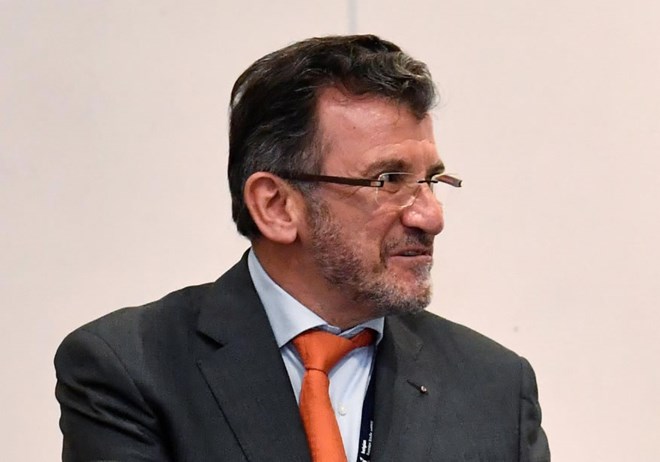
FILE PHOTO: Semlex CEO Albert Karaziwan attends a signing ceremony during an economic mission in Abidjan, Ivory Coast, October 24, 2017. REUTERS/Stringer/File Phot
Mogadishu (HOL) - A Belgian company that has been marred with allegations of corruption since it began selling passports in Africa in 2007 has called on the Somali government to cancel it's tender for e-passports. The group fears that the process will lead to "unfair competition, according to a letter from their lawyer.
Semlex Group, a privately-held company, created in 1992 by Albert Karaziwan, a Syrian-born businessman, sent a letter through Faber Inter. The message from the Belgian based law firm on behalf of its CEO accused the Somali government of ignoring their requests for extensions or clarifications to the tender.
The letter addressed to Public Procurement Department at the Ministry of Finance purports that Semlex went to a great deal to prepare for the tender process, including flying to Mogadishu to meet with "local partners" and providing passport samples and have sent a total of six reminders for clarification.
It went on to say that the lack of information put them at a competitive disadvantage and requested the federal government cancel the tender altogether.
"Despite our insistence, we faced a huge lack of information that did not allow us to propose a solution. Indeed, the scope of the project is not defined enough, and the requested specifications aren't accurate enough. We believe that this will lead to unfair competition in a transparent process."
"We hereby formally request the FGS to cancel the passport tender to clarify the needs to allow participants to be at the same level of information in a fair environment."
According to the company's website, Semlex won a contract in Jubaland in 2014 to provide biometrics ID cards, deeds certificates, civil servant cards, driving licenses, car registration, plates, visas and resident permits using biometrics.
Trail of shady deals
Despite referring to itself in the letter as "a leader for years in this field with proven tracks in the delivery of governmental projects in Europe and Africa", Semlex has a history of questionable dealings in Africa.
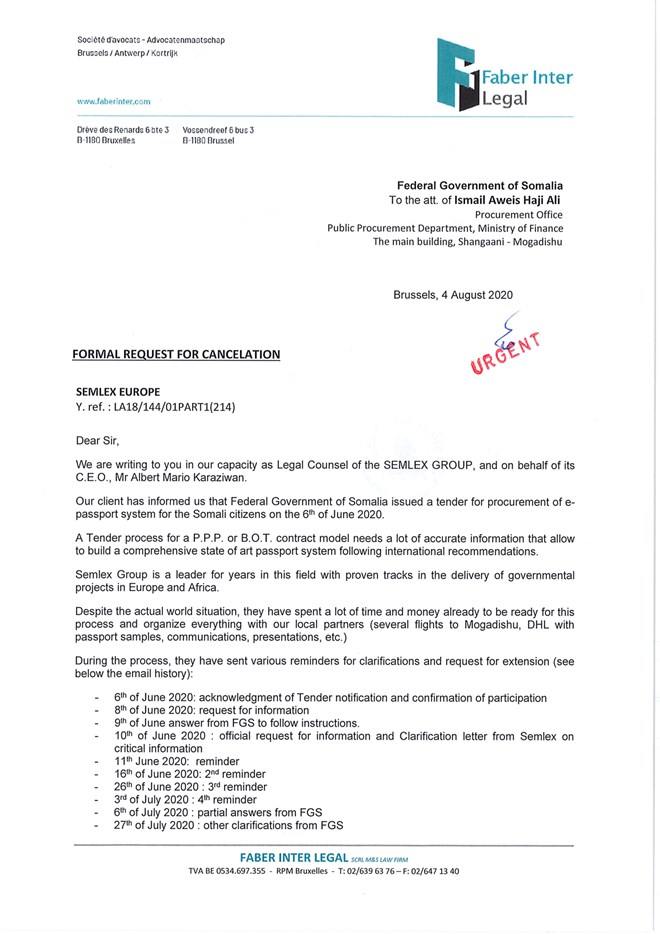
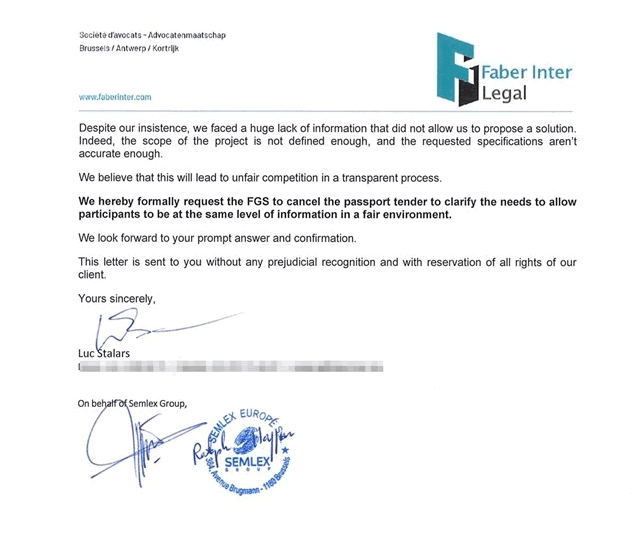
A copy of the letter sent to Somalia's Ministry of Finance
Ironically, an explosive Reuters investigation in 2017 uncovered that Semlex "made a fortune supplying expensive ID documents to poor Africans". It has also been accused of leveraging the CEO's political connections to score lucrative passport deals in Africa without going through the formal public tender process. The passports supplied by Semlex are also alleged to have ended up in the hands of foreign citizens deemed to be security threats.
Semlex was previously under investigation by authorities in Brussels for money laundering and other potentially illegal facets of his business.
Albert Mario Karaziwan, the founder and CEO of Semlex, was born in a family of eight in Aleppo, Syria in 1958. He moved to Brussels where he built an admirable business empire that spanned hotels, restaurants and real estate.
He entered the international identification business in 2007 when he landed a deal to supply the Comoros Islands, an archipelago off the south-east coast of Africa with passports. He was soon appointed as a "roving ambassador" by then-president Ahmed Abdallah Mohammed Sambi, who also retained him as a special advisor. Karaziwan's relationship with Comoros top brass was laid bare when he twice accompanied the Comoros delegation to the United Nations General Assembly.
Over time, a further eight non-Comoran Semlex staff and close associates of Karaziwan, including his wife and adult son, were appointed to diplomatic posts that spanned from Monaco to Mombassa. Karaziwan was also known to have a close relationship with Ibrahim Fahmi Said, then minister of foreign affairs in Comoros.
Investigators found that Comoros, a nation with just 800,000 people, had 2,800 diplomatic passports and at least 184 diplomatic passports were sold to non-Comorans.
One of the main advantage's of having a diplomatic passport is that it confers the holder with diplomatic immunity and can often facilitate business.
Comoros held a parliamentary commission to investigate the sale of passports to foreigners after a scheme to sell citizenship to stateless Bedouin people of the UAE and Kuwait ended up in the hands of foreigners. At $4,5000 per person, the programme was way to raise revenue for the Comoros Islands, but the passports found their way to Americans, Turks, South Africans, Syrian and Iranians. Two prominent Congolese nationals who were also involved in a deal to bring Semlex passports to Congo also received Comoros passports.
An Iranian, Hamid Reza Malakotipour, who was sanctioned in 2014 by the United States for his alleged connection with Iran's Revolutionary Guards in Syria was granted Comoros citizenship.
Comoros eventually cancelled 170 Semlex-supplied passports that went to foreigners and withdrew the diplomatic passport issued to Karaziwan.
Reuters found that more than 100 people who had their Comoros passports cancelled were Iranians skirting international sanctions.
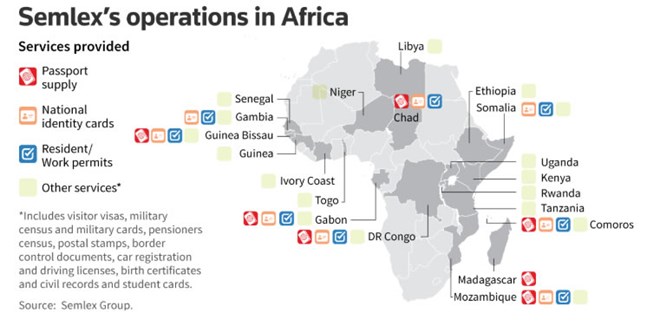
When the dust settled, a western diplomat quoted in the Reuters investigation estimated that there were between 5,000 and 10,000 Comoros passports that may have been bought by foreigners.
In 2017 Mozambique pulled out of a 10-year, nine-figure deal with Semlex that was awarded a decade earlier by the previous administration without a public tender. Semlex complained that the contract was "unjustifiably" terminated and called for an independent audit, but the Mozambique government refused.
The passports were seen as grossly overpriced at 80$ when over half of the population lived below the poverty line.
Semlex is accused of similar murky transactions when they entered an agreement to provide passports, visas, ID cards, and foreign residency cards in Guinea-Bissau after allegedly making payments to the Helder Tavares Proenca, the country's defence minister. Semlex did not win another contract in that country, according to officials.
In Madagascar, Semlex more than doubled the amount of money it took home in the revenue sharing agreement when they got their contract renewed in 2013. The Madagascar government received just 2.5 euros out of the 36.25 that it's citizens pay while Semtex received the rest.
Reuters uncovered invoices from a French state-owned printing firm that Semlex used to produce blank passports that showed Semlex paid between 1.75 euros to 2 euros per document for projects in Madagascar, Gabon and Comoros in 2007 and 2008.
Semlex's most egregious violations may have occurred in the Democratic Republic of Congo - one of Africa's most populous nations with 70 million people - where the company was awarded a contract to provide biometric passports at a steep markup in 2015. Before the deal, Congolese citizens were able to obtain passports for 60$, but that price skyrocketed to 185$ - making it one of the most expensive in the world in one of the most impoverished countries in the world.
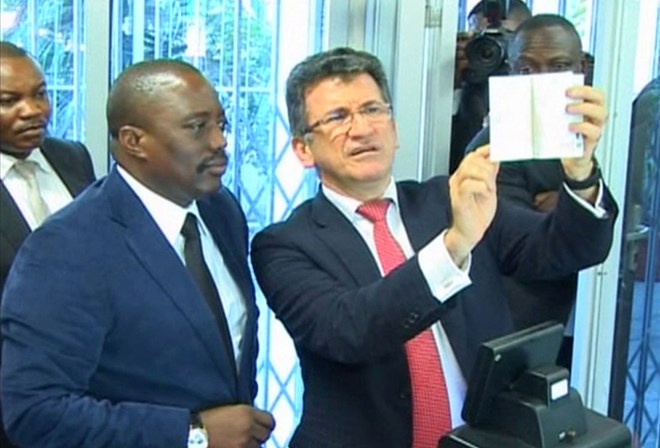
CONGO DEAL: President Joseph Kabila of the Democratic Republic of Congo, left, alongside Semlex CEO Albert Karaziwan during an event in Kinshasa to launch the country's new biometric passports in November 2015. RTNC/Handout via REUTERS TV
The government of the DRC received a paltry 65$ of each passport. At the same time, the rest of the revenue was split between Semlex and a dubious Gulf company called LRPS that was widely believed to be owned by former president Joseph Kabila's close relative. As with ex-President Sambi of Comoro, Karaziwan is found to have a warm relationship with Kabila.
Emmanuel Adrupiako, a Kabila adviser who received a Semlex-supplied Comoros passport and helped handle the DRC passport deal allegedly received $700,000 in his private bank soon after the deal was sealed.
A concurrent theme throughout Semlex's dealings in Africa seems to suggest that the Belgian-based company consistently receives a disproportionate amount of the funds compared to the contracting government.
The contract with the DRC expired in June 2020. After internal pressure from opposition figures, the government has announced that it will not renew the contract, opting to suspend passport production and tender for a new passport provider as allegations of corruption and money laundering continue to dog Semlex.
In May, a conglomerate that consisted of 51 Congolese citizens and human rights organizations filed a civil action lawsuit in Belgium against Semlex.
Luc Stalars, the lawyer for Semlex who sent Somalia's Ministry of Finance the letter requesting they cancel the tender process denied allegations of impropriety, calling them part of a "defamatory smear campaign".
With files from Reuters